A notorious drug kingpin established shell companies in the British Virgin Islands and Dubai to hire suspected cartel members, according to documents

Sarajevo-native Edin “Tito” Gacanin registered the companies in the secrecy havens as he continued to ship cocaine globally, despite being convicted by Dutch courts for narcotics trafficking.
n international cartel leader accused of deluging countries in Europe and beyond with cocaine and amphetamines set up a company in Dubai to employ key members of his organization, including three men accused of drug trafficking, money laundering and attempting to overthrow the Bosnian state, records leaked to the International Consortium of Investigative Journalists reveal.
Edin “Tito” Gacanin, a Netherlands passport holder and native of Sarajevo, Bosnia-Herzegovina, has been convicted of trafficking huge quantities of narcotics to Europe from Colombia, Peru and Ecuador. The U.S. Treasury’s Office of Foreign Assets Control sanctioned him in 2023, calling him “the leader of the Tito and Dino Cartel” — reportedly part of a super cartel of notorious criminal organizations that include the Kinahan organized crime group of Ireland, the Dutch Mocro Maffia and Italy’s Camorra — and a transnational money launderer.
Gacanin lives freely in the emirate of Dubai, one of seven sheikhdoms, or emirates, that make up the United Arab Emirates, a confederation with a thriving trade in financial secrecy, shell companies and opaque free zones. The UAE is now also home to several international drug traffickers, many considered high-value targets by police and several under sanctions.
Born in 1982, Gacanin grew up in the southern Dutch city of Breda after his family fled the Bosnian war of the early 1990s. He later made numerous visits to Peru, where four crime families in the town of Trujillo were allegedly producing cocaine and preparing shipments to Europe for him while liaising with key locally based Gacanin lieutenants originally from the Balkans, several of whom he had known since childhood.
By 2014, he had moved again, this time to the UAE, where the following year he set up a company in the city of Dubai called Edin DMCC, which, according to leaked documents, only a few months later changed its name to Edin Group DMCC, apparently to mirror the name of a parent company, Edin Group Ltd., set up in the British Virgin Islands around the same time using the agent Overseas Management Company Trust Ltd., also known as OMC.
In garbled English, the company’s business plan says: “Edin Group will administrative [sic] consultancies and studies to public departments and companies as regarding administrative performance analysis, procedural engineering, laying out flow-charts and related documents circulation, internal policy formulation, organizational restructuring, strategic plans development, innovating work procedures, designing balanced scorecards.”
The leaked records include Gacanin’s Dutch passport and his 2014 Dubai residency card, which states that he is the managing director of ENG International, another Dubai company. Gacanin signed a letter in February 2016 to Dubai authorities as “General Director” of ENG International, stating that the company had no objection to Gacanin opening, managing and operating a branch in Dubai. Judging by the documents, no authorities in Dubai or the British Virgin Islands raised objections to Gacanin establishing companies, despite the fact that he was a convicted drug dealer.
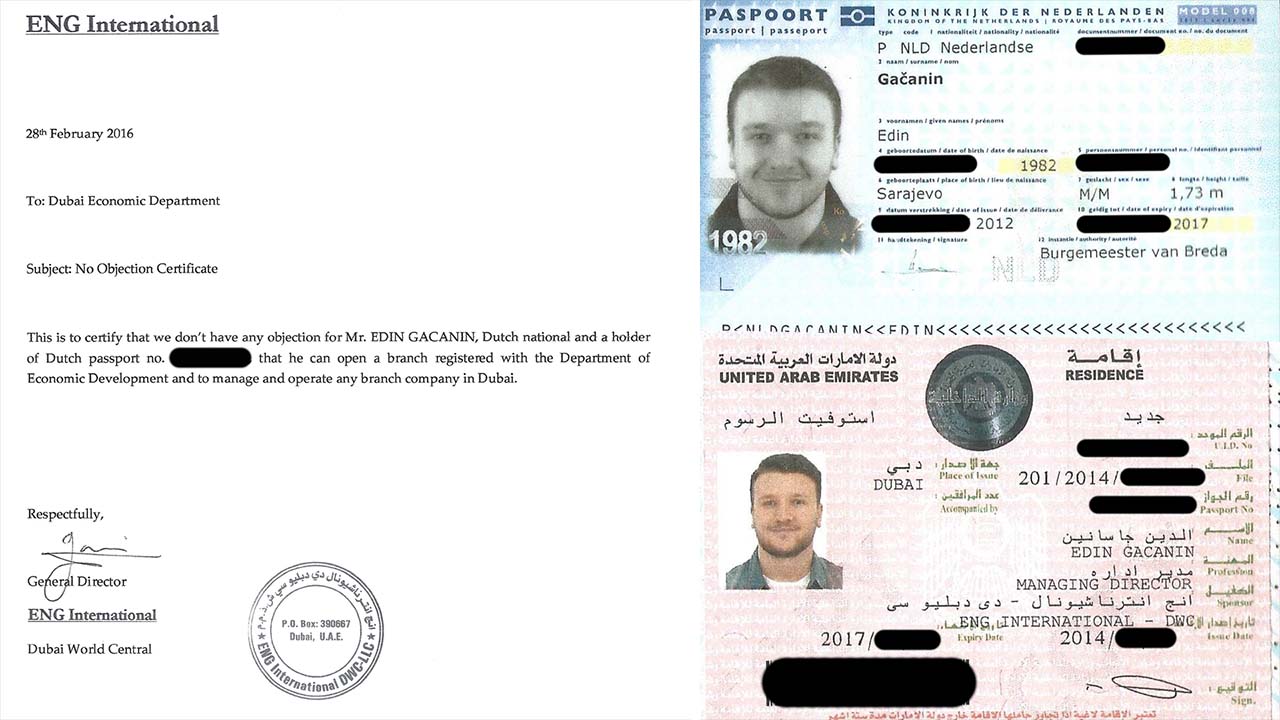 A letter from ENG International to Dubai authorities, left, and Edin Gacanin’s Dutch passport, top right, and Dubai residency card, bottom right.
A letter from ENG International to Dubai authorities, left, and Edin Gacanin’s Dutch passport, top right, and Dubai residency card, bottom right.
In response to questions from ICIJ, a spokesman for the DMCC confirmed that a person called Edin Gacanin had been associated with a company in its free zone until 2021. The spokesman said the DMCC was not aware of any allegations against the person at the time they had a company registered in the zone. He defended the DMCC’s screening process as “robust”, saying it performed extensive due diligence checks on applicants and had the power to terminate companies and individuals for transgressions.
A striking detail in the records is that two high-ranking Panamanian UAE consular officials jointly notarized a certificate of incorporation and a certificate of incumbency for the BVI-based Edin Group Ltd., using their signatures and the consulate’s official stamp, along with a local notary, effectively allowing OMC to create a shell company for Gacanin, which paved the way for the convicted drug dealer to establish other companies in the UAE.
One of the officials who notarized the documents was then the consul general of Panama to the UAE, Eduardo Fonseca Ward, whose father, Ramon, co-founded the law firm at the center of the Panama Papers scandal, Mossack Fonseca. Neither Fonseca Ward nor the consul general of Panama responded to questions from ICIJ. The Panamanian and British Virgin Islands’ governments did not respond to questions either. Gacanin’s BVI company appears to have been struck off the BVI register in 2020, according to The Virgin Islands Official Gazette. Earlier this month, the former premier and finance minister of the BVI, Andrew Alturo Fahie, was convicted of conspiring to traffic thousands of kilograms of Colombian cocaine through BVI ports to Miami for the Sinaloa cartel.
Leaked files show Fonseca Ward notarized documents for other OMC companies. The government of Panama has previously faced scrutiny for permitting its diplomatic network to assist in the creation of shell companies. In 2016, the publication Panama America reported that Ramon Fonseca had used his influence as minister-counselor in the government of Juan Carlos Varela to help Mossack Fonseca expand its reach through the creation of shell companies, including in Dubai, where his son was consul general.
Ramon Fonseca died in May while on trial in Panama along with his former law firm partner, Jürgen Mossack, and 26 others over their alleged role in setting up shell companies involved in two corruption scandals. Coincidentally, the same month, Bosnia and Herzegovina announced the dismissal of its honorary consul in Panama, Fatih Kol, after declaring that the volunteer diplomat and businessman was suspected of belonging to the Tito and Dino cartel. Kol did not respond to a request for comment from ICIJ.
Record cocaine seizures
The sanctions against Gacanin, dubbed the “European Escobar” after the notorious Colombian drug lord Pablo Escobar, were coordinated by Europol and the governments of the Netherlands, France and Belgium. Gacanin is accused by the U.S. of being one of the world’s top 50 drug dealers and a threat to regional stability and institutional trust in the Western Balkans. Separately, Bosnia and Herzegovina prosecutors say his cartel has attempted to take over the state itself by paying off politicians while working with the head of the state security services and by laundering money internationally.
In 2022, for the sixth year in a row, European Union member states reported a record amount of cocaine seized, 356 tons. Belgium, Spain and the Netherlands reported the highest volumes. As European ports are flooded with cocaine, health agencies struggle to grapple with soaring drug addiction rates, and cities like Amsterdam, Dublin and Belgrade, Serbia, are threatened by the cocaine boom’s attendant violence, including numerous drug-related killings.
Dubai and other UAE cities continue to harbor narco-traffickers and their shell companies.
Gacanin was arrested in Dubai in November 2022 as part of Operation Desert Light at the request of the Netherlands. A Dutch court later sentenced him in absentia to seven years in prison for trafficking huge quantities of cocaine and methamphetamine precursor chemicals, and fined him $1 million. But he wasn’t extradited and is now living freely again in Dubai. Citing sources close to the investigation, the Amsterdam newspaper Het Parool reported that the Netherlands had failed to seek Gacanin’s extradition within a 40-day window after his arrest, set by the UAE. Dutch prosecutors denied any blunder.
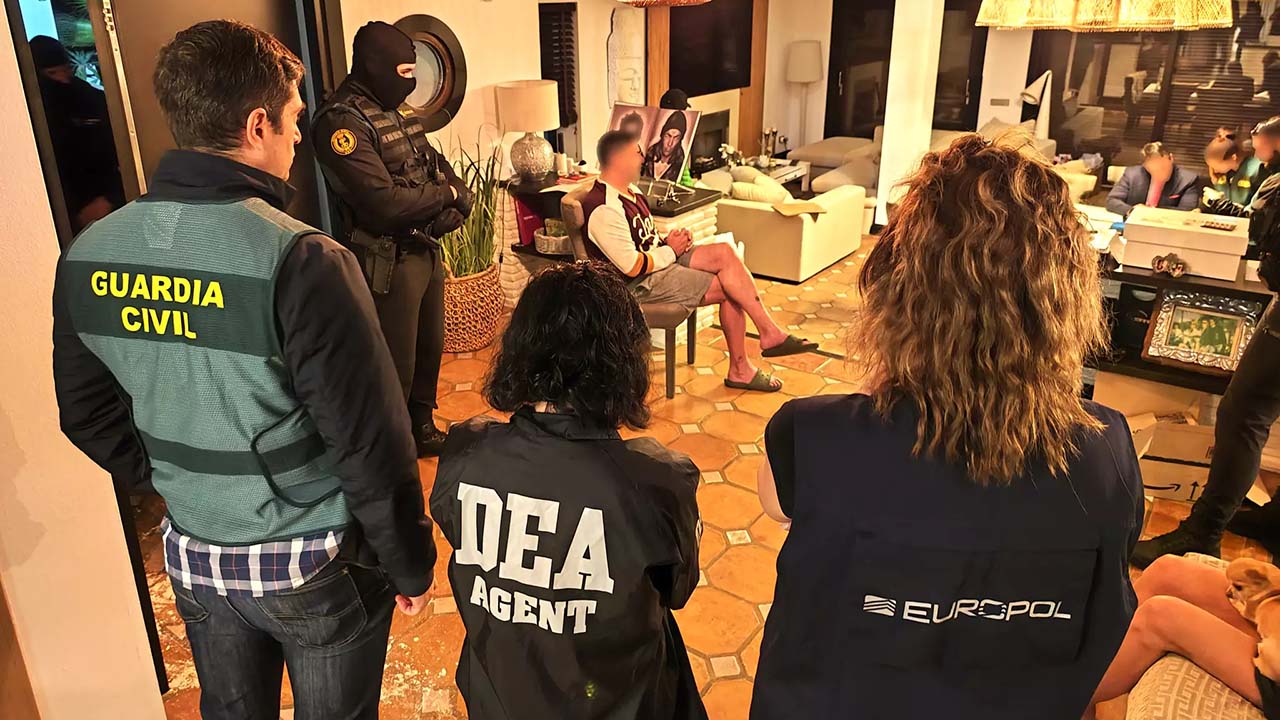
Agents from multiple agencies taking part in Operation Desert Light that targeted drug cartel activities in the UAE and beyond.
The evidence against Gacanin in the Dutch case largely came from decrypted messages on the Canadian Sky ECC messaging platform. They showed him steering the importation of thousands of kilograms of cocaine and methamphetamine precursor chemicals sourced from China into the Netherlands, Belgium and Germany in 2020, according to the Rotterdam District Court judgment in November. Gacanin cut a deal with prosecutors to get a shorter sentence in return for not contesting the evidence, according to earlier reporting by ICIJ media partners NRC.
Gacanin was arrested along with three Dutch Moroccans, a Panamanian named Anthony Alfredo Martinez Meza (alias Hassan) and a Briton called Ryan “Robo” James Hale, who are also allegedly criminal associates of the Kinahans. The Sky ECC messaging network and the Canadian company that developed it shut down in 2021 after a series of police raids.
According to Spain’s Civil Guard, Hale and Martinez Meza allegedly used Sky ECC texts to track nearly 700 kilograms of cocaine that authorities ultimately seized in a container in the port of Valencia in 2020. Martinez Meza, a director and officer of several Panamanian companies, allegedly texted his frustration after the seizure of the cocaine: “I shit on my fucking life.” Dubai Police did not respond to questions from ICIJ about Martinez Meza, Hale and Gacanin.
In an interview, the head of the Civil Guard’s Central Anti-Drugs Group, Fran Torres, told ICIJ that police from several countries were able to trace the narcotics seized in Valencia back to Panama. And then by decrypting Sky ECC messages, authorities tied their transport and sale to what Torres was the first to term a super cartel, “whose brains” were in Dubai.
Torres said the cooperation of Dubai Police Commander-in-Chief Abdullah Khalifa Al Marri had been vital to securing the arrest of the six Desert Light “capos” (Gacanin, Hale, Martinez Meza, Zouhair Belkhair, Hoesny Ajaray and Rabhiou Bourfa); and he confirmed that Spain had requested the extradition of Hale and Martinez Meza, so far without success.
“We know that the six Desert Light capos arrested in Dubai are free, but they can’t leave the country because their passports have been seized, but they don’t want to leave either. Where are they going to go?” Torres said, adding that Dubai extradition requests were prone to excessive delays due to red tape made worse by complex international treaties.
At-large in Dubai
Despite Gacanin’s conviction and the sanctions against him, Europol and Bosnian prosecutors have accused him of continuing to steer drug trafficking from Brazil, Colombia and Peru to Europe and Australia from his base in Dubai, where his Kinahan gang associates live freely, too. Balkan narco-traffickers have also been accused of transporting enormous quantities of cocaine to the U.S., most famously following the record seizure of about 20 tons of the drug on the MSC Gayane in the port of Philadelphia in June 2019.
The Kinahans and Ryan “Robo” Hale — who like the Irish mobsters had lived in southern Spain for many years — fled to Dubai to avoid being attacked by rivals around the same time that Edin Gacanin was setting up his local operation in the luxurious Persian Gulf state, which has until recently offered international criminals personal security and barely any chance of extradition.
Macarena Arroyo Marín, an anti-drug public prosecutor for Algeciras and Campo de Gibraltar in Spain, told ICIJ that her country was struggling to secure the extradition of another drug lord, Alejandro Salgado Vera, known as El Tigre, because of constant obstacles put in place by the UAE. “When it comes to going to court, everything gets complicated, the judicial process gets slowed down and they ask for much. We send them new documents and they don’t respond.”
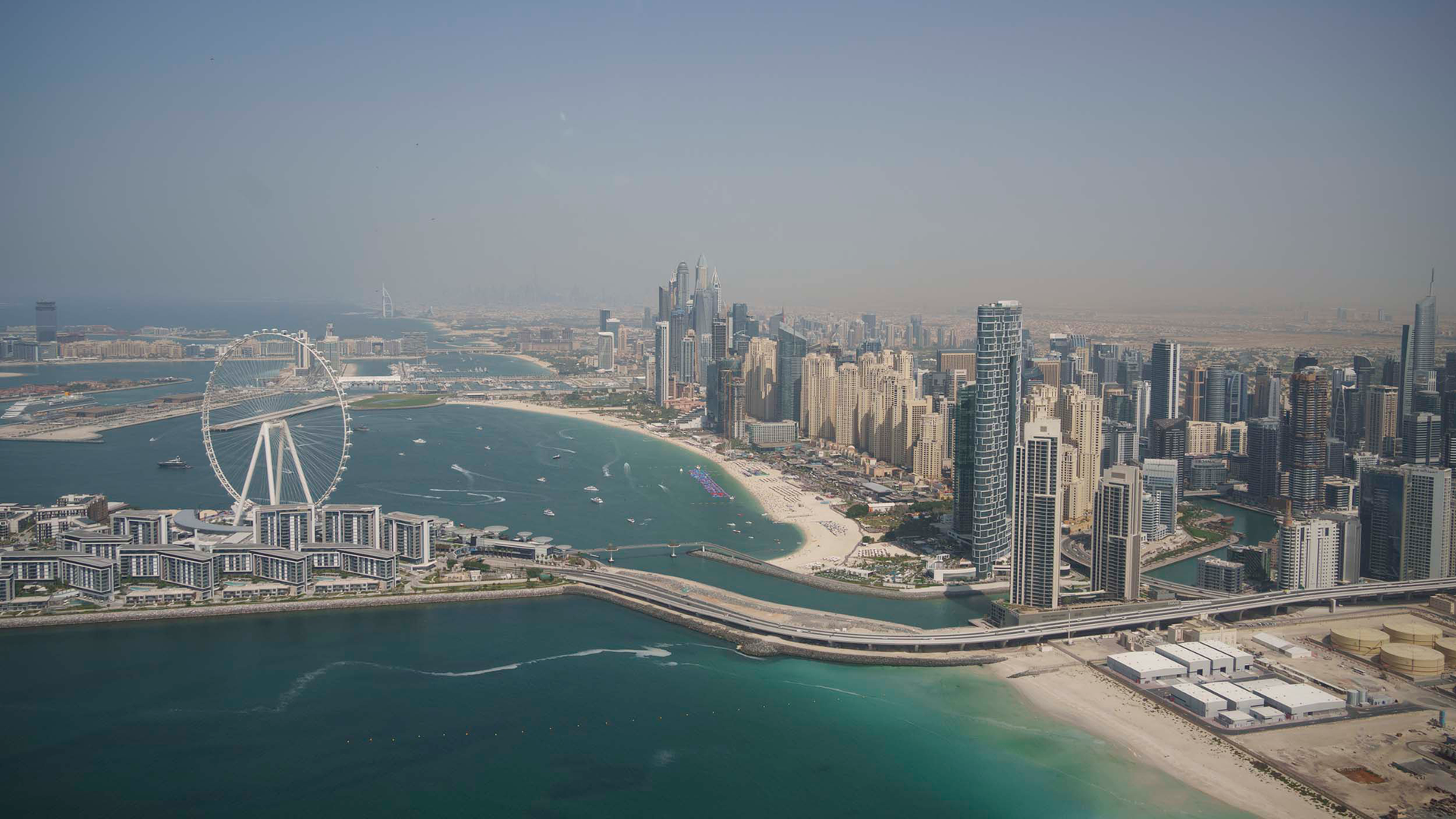
Dubai, a city in the United Arab Emirates, is known for its luxurious and glamorous lifestyles.
Arroyo Marín said the city of Algeciras was beginning to rival Valencia, Antwerp and Rotterdam as a port of choice for Latin American narco-traffickers moving huge quantities of cocaine, and local drug traffickers were for the first time channeling their drug profits into assets in Dubai rather than laundering them in Gibraltar. She said the drugs were now often taking what was known as la ruta de la banana, which has been identified as a key route for cocaine being smuggled by Balkan organized crime groups.
“The banana route, or ‘ruta de la banana,’ runs mainly from Brazil, Ecuador and Costa Rica to Europe. Criminal organizations use it to take advantage of the solvency of multinational banana companies that already have established trade flows and are not suspect. They do not use new shipping companies, which may be suspect,” Arroyo Marín said.
“One of the main problems we have is corruption in the ports. They either disguise the drugs in legal goods (tropical fruits, timber), or they use what is known as the blind hood, ‘gancho ciego,’ or the lost hook, ‘gancho perdido,’ which consists of putting bags or rucksacks into a container where the drug is disguised among the legal goods.”
Registered offshore firms even after trafficking convictions
According to the Rotterdam court judgment, Gacanin had two convictions for drug trafficking before his move to Dubai, raising questions about how he was allowed to set up companies both in the British Virgin Islands and Dubai without any objection from their governments, company formation agents, or the special tax zone where he registered his Dubai company that is known as the DMCC.
Gacanin’s Dubai company Edin Group DMCC was registered at an address at Jewellery & Gemplex 3, a tower complex in Dubai’s Jumeirah Lakes DMCC business park, one of dozens of opaque internal so-called free-trade zones. Gacanin provided his personal address as a unit at Khalifa Tower Zone 4, part of the world’s tallest skyscraper, the Burj Khalifa, which looms over Dubai, offering panoramic sea and city views.
The company hired a former DMCC employee, Dutch Moroccan national Naoual Haddouch, to run what the firm described as its “administrative consultancy” services to the Gulf states. Haddouch did not respond to questions from ICIJ.
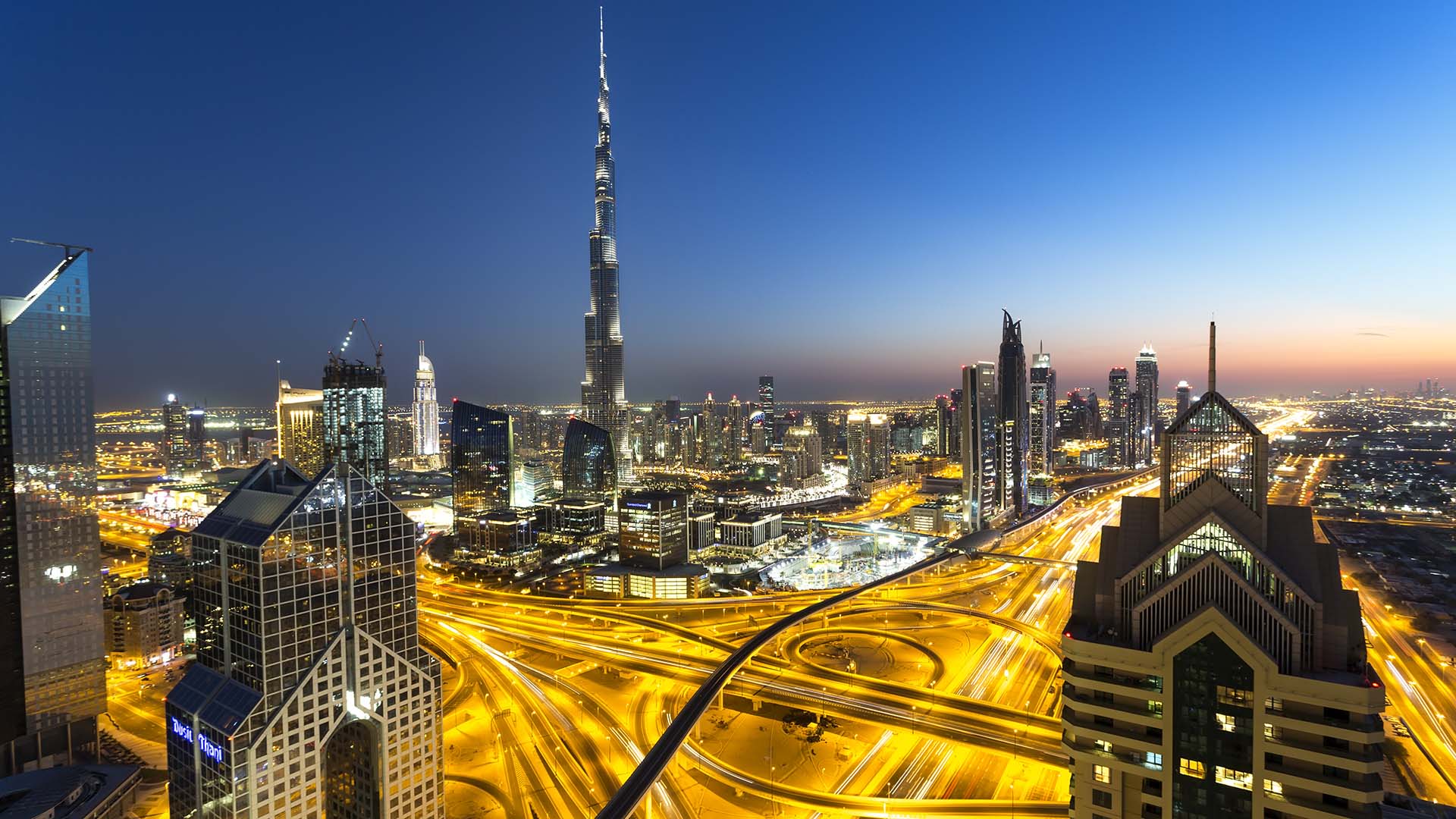
Elevated view of Dubai looking over Sheikh Zayed Road towards the Burj Khalifa.
Simultaneously, Gacanin registered Edin Group Ltd. using OMC in the British Virgin Islands, another secrecy jurisdiction known for lax oversight. In the leaked records, Gacanin is identified as chairman, director and owner of Edin Group Ltd. while OMC’s managing director, Sandra Vasquez, is listed as the company’s registered agent.
Gacanin’s Edin Group DMCC invested — via a second company called Dubai Free Zone Eden Group — in a hair salon owned by its Emirati registered agent, Taher Naser Ali Hussain, called House of Handsome Gents Salon, according to Dubai records ICIJ accessed on Sayari, a database of corporate and trade data. Those records also show that Hussain and Haddouch co-owned a business called Dutchies Sweets and Treats LLC and that she managed another he owned called Earth Concepts Middle East Water Trading LLC. Dutchies Sweets and Treats is a cafe at Kite Beach, Dubai. Hussain, who owns a restaurant company, Chef Latino Restaurant LLC, too, could not be reached for comment. Earth Concepts Middle East is a beverage company. According to Edin Group DMCC HR executive Amor Mae Mifana’s LinkedIn profile, she handles staff from a salon, coffee shop, restaurant and water company , which suggests that Hussain’s operations are tied to Edin Group DMCC. Mifana did not respond to questions from ICIJ.
Patrick de Nekker, the co-founder of Earth Concepts, an Amsterdam-based social enterprise that sells water to raise money for international relief projects, told ICIJ that his company sold Naoual Haddouch several pallets — “max one container” — of its branded Earth Water several years ago. “We were happy to sell some pallets to her — and make some money — and tell our friends you could buy Earth Water in Dubai, too. After that period we haven’t had any contact with her.” De Nekker said his company never had any dealings with Hussain and had no connection to Earth Concepts Middle East.
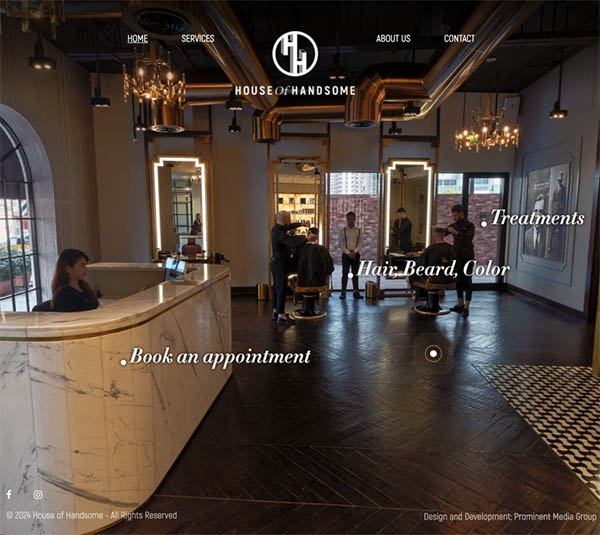
The House of Handsome Gents Salon website boasts that it “is an elegant, luxurious, welcoming place where men can experience services that focus on their physical and mental welfare, beauty and style.” The Dubai salon did not respond to questions from ICIJ.
OMC states on its website that it can “conduct extensive searches, examine existing documentation, and validate information” to help its clients mitigate the risks associated with non-compliance with anti-money laundering regulations. Both the British Virgin Islands and the UAE profess to be part of the global fight against money laundering. Under UAE law, there are both civil and criminal penalties for failing to comply with anti-money laundering regulations.
In response to questions from ICIJ about what, if any, due diligence it had performed on Gacanin, Overseas Management Company Trust, an arm of the global OMC group, which is based in Panama and has offices worldwide, including in Dubai, said in a statement: “OMC is committed to maintaining a robust compliance program, which includes comprehensive due diligence policies and procedures.”
OMC added: “OMC adheres to all applicable laws in the jurisdictions in which we operate and cooperates fully with regulators and law enforcement in all inquiries and investigations. We consistently strive to exceed standards and take pride in the work we do.” A previous ICIJ investigation identified at least 21 politicians and public officials among the Panamanian firm’s clients.
Neither Gacanin nor his lawyers responded to requests for comment.
Firms employed alleged cartel operatives
Dubai, with its legions of shell companies, maze of free zones and shadowy regulatory system, is a haven for clients who prefer to keep their identities and intentions under wraps.
By 2018, Edin Group had a new address in the DMCC at the business center at Jumeirah Lakes Towers, and it claimed to have employed Gacanin’s alleged cartel deputy Adnan Smajlovic. Smajlovic is accused of receiving about $300,000, and holding and distributing the money to criminal associates in Bosnia and Herzegovina on behalf of Gacanin’s cartel in August 2020.
The company also hired a French Bosnian, a former Bosnian policeman turned bodyguard and three others with no previously reported criminal ties: a native of Gacanin’s hometown in the Netherlands, a Brazilian woman and an Ethiopian woman who appears from health insurance forms to be one of three Ethiopians on the staff. Smajlovic, who allegedly oversees the Tito and Dino cartel’s Bosnia and Herzegovina operations, was employed by Edin Group DMCC as an “accounting clerk.” French national Sancez Jukic was contracted to work with Edin Group DMCC in sales the same year.
According to the Bosnian prosecutors, from 2016 to 2021, Smajlovic and Gacanin, through the Sky ECC app, directed a money laundering operation for Gacanin’s cartel in Bosnia and Herzegovina, the UAE, the Netherlands, Belgium, Germany, South American countries, the Republic of South Africa and other nations. Jukic, who was identified by prosecutors as the procurer of large quantities of cocaine for Gacanin’s cartel, is in custody in Bosnia and denies being part of the network.
Dzenis Kadric, a onetime Bosnian police officer who was arrested in his home country in February in an operation codenamed Consigliere on suspicion of participation in organized crime, drug smuggling and money laundering, was also hired by the Edin Group. Kadric was employed for an “unlimited period” as an “archive clerk,” subject to a six-month probation, according to an employment contract dated Dec. 1, 2016. Kadric, who has been photographed alongside Gacanin in Dubai and been described as his bodyguard, was arrested after flying back to Sarajevo from Dubai last December. He is free but awaiting trial. His wife is famous in their home country as a social media influencer. The couple lived in Dubai with their cat, El Chapo, who is presumably named after the former Mexican drug lord Joaquin Guzman, ICIJ partner KRIK has reported.
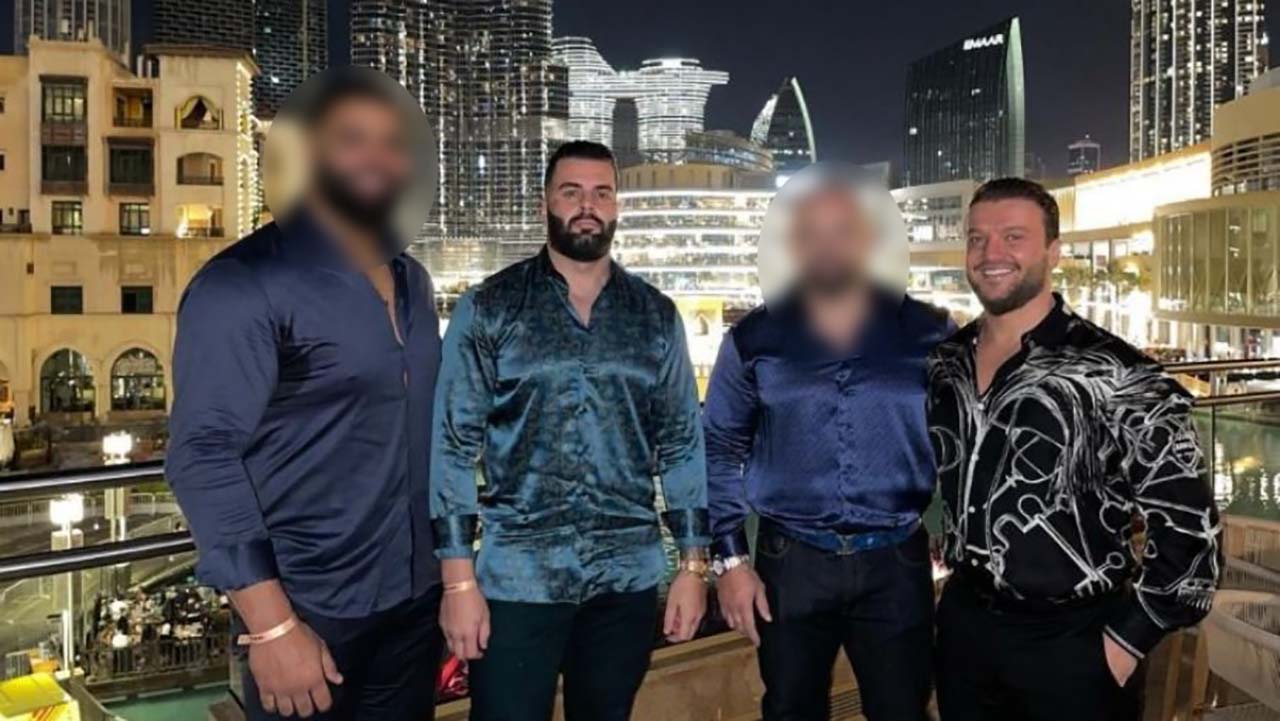
Dzenis Kadric, second from the left, and Edin Gacanin, far right, photographed together in Dubai.
In July 2017, Edin Group employed a Dutch national, Lesley Sonny Zimmerman, from the same town where Gacanin’s family is based, Breda, as a “follow up clerk.” In 2018, the company added a Brazilian named Queila Garcez Da Silva to its sales team. From that date on, the young woman who had previously worked for a non-government organization caring for the needy in Sao Paulo began to publish photos of herself at luxury retreats and spectacular locations in Dubai, Italy, France and Greece. The following month, Edin Group employed a young Ethiopian woman, Hermela Tadesse Bekele, as another “follow up clerk.”
A raid in Sarajevo
In two 2019 operations — one codenamed Bee, the other Banana — Peruvian authorities prevented the shipment of more than five tons of cocaine for Gacanin’s cartel. They also arrested several of his alleged local associates following the raids. The cartel has also been linked to huge shipments of cocaine seized in Sri Lanka, Antwerp and the Spanish port of Algeciras.
Then, in April of this year, Bosnian police deployed to about 30 locations in Sarajevo in a large-scale operation codenamed Black Tie that led to the arrest of 23 people, including several high-ranking Bosnian law enforcement officials suspected of close links to Gacanin. Local police were supported by Europol, the FBI and the U.S. Drug Enforcement Administration. Many of those arrested were later released without charge. The investigation is ongoing.
Anesa Agovic, a Bosnia-based field coordinator for the Global Initiative Against Transnational Organized Crime, told ICIJ that Gacanin’s cartel had infiltrated law enforcement, politics and sports in the Balkans, through bribery, funding election campaigns, exploiting political instability and establishing front companies. She said the involvement of young, successful people, including athletes, with no known criminal records was surprising.
“The complex nexus between organized crime, corruption and political influence in Bosnia and Herzegovina underscores the urgent need for comprehensive measures to combat criminal networks and safeguard democratic institutions,” Agovic said. “The decryption of Sky ECC messages has revealed the extent of criminal activities and their connections to state actors, highlighting the need for coordinated national and international efforts.”
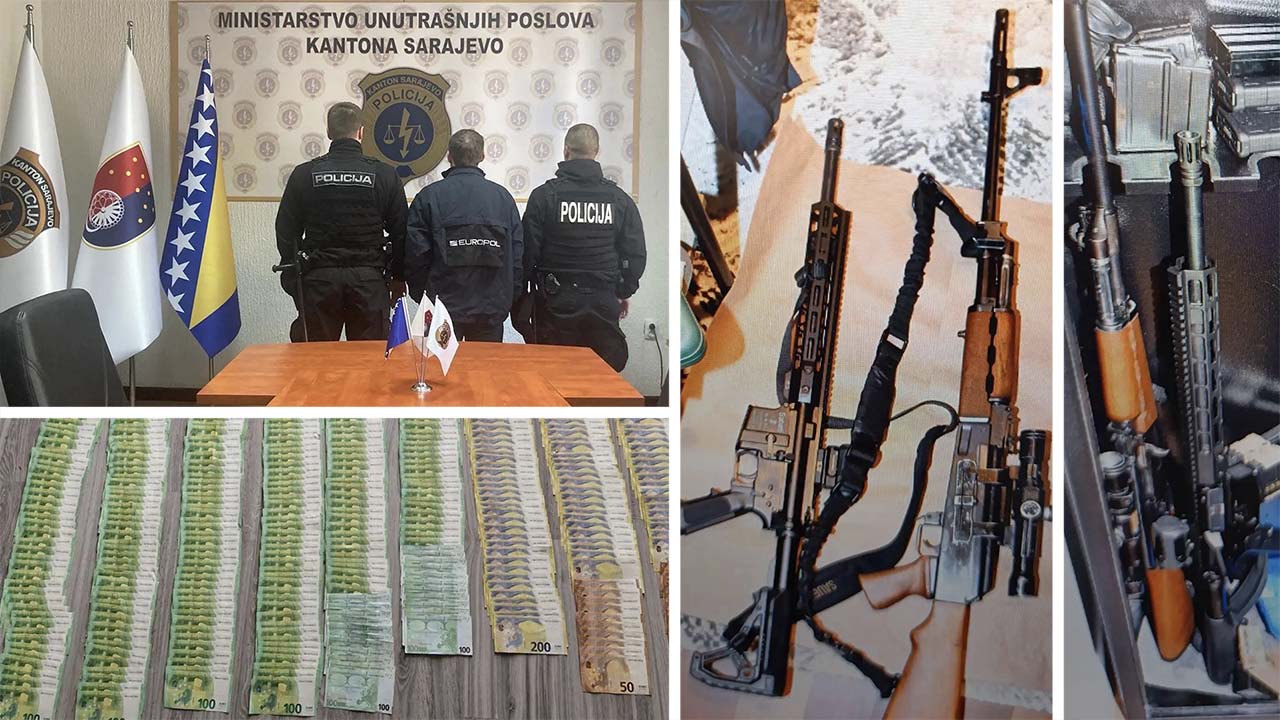
Images released as part of Operation Black Tie, showing seizures of cash and weapons from the Tito and Dino Cartel.
Agovic said Smajlovic, Jukic and a local politician named Aida Halac were the only three people still in custody as a result of the April raids. She said Halac was a former professional boxer and the owner of a gym in the city of Zenica, as well as a councilor for the BHI Kasumovic Fuad Party, and was accused of receiving payments for her mayoral campaign from Gacanin and communicating with him secretly. According to Agovic, Halac is a cousin of David Cufaj, a boxer who was convicted in absentia in Peru of trying to smuggle more than two tons of cocaine in metal containers with asparagus to Belgium for Gacanin. Camouflaging cocaine in shipping containers alongside everyday exports like asparagus, bananas, coffee and pineapples is a tactic known as “within the load.” It typically requires traffickers to run front companies to organize the exports, which they either set up themselves or acquire from businesses with clean histories. For organized crime, owning companies also allows them to covertly launder profits
Smail Sikalo — another fugitive from Peruvian justice who fled to Bosnia and Herzegovina after being arrested in Trujillo, accused of smuggling 1.4 tons of cocaine — was among those arrested in the Black Tie raids and later released. An extradition request from Peru for Sikalo was rejected by Bosnia and Herzegovina. A Peruvian judge was accused by Lima’s Office of Misdemeanors Control of mistakenly allowing Smail to go free and was suspended over the scandal.
A supply glut and a booming market for coke
The pursuit of Gacanin has revealed how some of the world’s top drug dealers were able to work together in Dubai to procure cocaine in huge quantities from producer countries in Latin America for consumption in Europe.
According to the U.N. Office on Drugs and Crime, Europeans accounted for 24% of all global users of cocaine in 2020. Covid-19 disrupted drug markets, and with international travel sharply curtailed and nightclubs closed, producers struggled to get their drugs to market. But UNODC said that this slump had little effect on longer-term trends and that global supply of cocaine is now at record levels, partly due to the expansion of coca bush cultivation and partly due to improvements in the process of conversion from coca to cocaine hydrochloride.
UNODC says the dominant role of Colombia’s ports as a point of departure for cocaine bound for Europe is declining, with traffickers increasingly moving their products through South and Central American countries. Gacanin reportedly established his cartel’s Latin American cocaine trade in the Peruvian port of Callao, near the capital of Lima and an important launching point for cocaine heading to European markets.
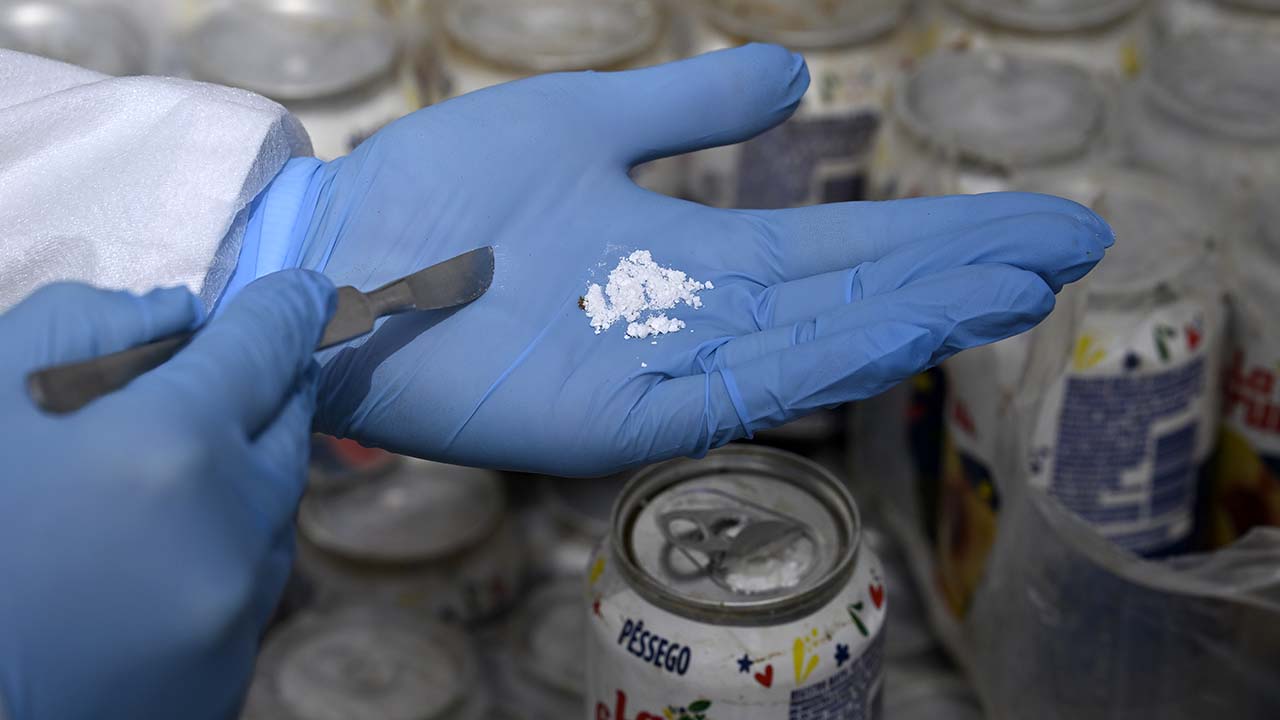
Cocaine from a seizure in May 2024 in Portugal. The drug had been hidden in peach juice cans from a Latin American country.
Cocaine is typically available in two forms in Europe: powder and the less common smokable crack cocaine. It originates with coca leaves chopped up by peasant farmers in Colombia, Ecuador and elsewhere, treated with cement, quicklime and sulfuric acid, then left to sit in vats of gasoline before a paste is extracted from the goo using sulfuric acid, caustic soda and ammonia. The paste is sold to traffickers for hundreds of dollars per kilogram. They, in turn, process it into the powdered cocaine hydrochloride, which is transported around the globe and can sell for tens of thousands of dollars per kilo.
Joao Matias, a scientific analyst with the European Monitoring Centre for Drugs and Drug Addiction’s public health unit, told ICIJ that wastewater analysis showed that since 2016 cocaine has blanketed Europe as never before.
“It is easier than ever for people to access the drug. Purity has risen. Problematic use has worsened. Crack cocaine has spread beyond urban centers. Hospitalizations due to cocaine use have increased. Scandinavia and countries like Latvia, Lithuania and Estonia are seeing widespread use for the first time,” Matias said, adding that cocaine use increases the risk of suicide, accidental death, heart attack and stroke.
Buying and selling properties in Dubai
Gacanin attended the lavish Dubai wedding of Kinahan cartel boss and boxing impresario Daniel Kinahan and Caoimhe Robinson, held in 2017 at the Burj Al Arab hotel. The guest list included Italian Camorra crime boss Raffaele Imperiale, Dutch-Moroccan crime boss Ridouan Taghi and Dutch-Chilean gangster Ricardo Riquelme Vega, known as El Rico. Sky ECC and DEA intelligence, married with testimony from a Dutch witness, revealed that the wedding doubled as a meeting for an international drug super cartel that had established an investment fund for shipments of cocaine.
When interviewed by Dutch and Italian authorities in September 2023, Imperiale, a Mafia boss later turned informant, spoke of the cartel leaders and an international cast of criminal associates crisscrossing the planet, organizing and receiving huge cocaine shipments, having capital of “80 or 100 million euros” (between $84 million and $105 million at the time), entering into “joint ventures” with Colombian cartels, and organizing assassinations, or “liquidations,” using assassins known as ninjas, according to transcripts obtained by ICIJ partner NRC. Imperiale — who began his criminal career selling cannabis in an Amsterdam coffee shop — said of meeting Gacanin in Dubai: “There was also someone from Montenegro there who speaks Dutch, Spanish, Italian. … His name is Gaghi.”
Imperiale discussed Colombian assassins who were hired by criminal cartels and others through agencies in the Netherlands, saying: “It’s not like in Italy, where hit men are trained from an early age, are educated. There are agencies that get money for that, 1 million euros [$1.05 million], and then they give 30,000 euros [about $31,600] to the guy who does the liquidation and he gets arrested.” He explained that “ninja” is Colombian slang for an assassin; ninjas kill with guns or knives depending on preference, and “they commit liquidations all over the world” for drug dealers who are all competitors with, and all dependent upon, one another at the same time.
Despite Gacanin being a target for many of the world’s top law enforcement agencies, his British Virgin Islands company, Edin Group Ltd., was provided with a certificate of good standing by another UAE free zone, the Jebel Ali Free Zone Authority (JAFZA), on behalf of the government of Dubai in 2018, according to leaked records. JAFZA, which claims to be one of the world’s biggest free zones and “an ecosystem” offering access to over 3.5 billion people across the region, declined to comment.
Ridouan Taghi, the Dutch-Moroccan crime boss, was arrested in Dubai and then extradited to the Netherlands in 2019. The star witness in the case against him was Nabil B, an Amsterdam lookout for his organization. Both Nabil B’s brother, Reduan, and lawyer, Derk Wiersum, were killed. Two years later, renowned Dutch crime reporter and a confidant of the witness, Peter de Vries, was also killed. Taghi was sentenced to life imprisonment earlier this year for five other slayings and two attempted killings. “He decided who would be killed and spared no one,” the judge said. De Vries said before his death that he was on Taghi’s hit list, but Taghi was not formally linked with or charged with the reporter’s killing.
Imperiale, who had been on the run for five years, was arrested in Dubai in August 2021 and extradited to Italy in March 2022. He reportedly handed over to the Italian government a man-made island, named Taiwan, valued at tens of millions of dollars, off the coast of Dubai as part of a plea deal. Imperiale earned the nickname the “Van Gogh boss” because he possessed stolen works by the Dutch master. He has now become a state witness against the Camorra, the criminal network in which he was a high-ranking member for over two decades. Information provided by him has led to the recovery and return of the paintings “View of the Sea at Scheveningen” (1882) and “Congregation Leaving the Reformed Church in Nuenen” (1884), to Amsterdam’s Van Gogh Museum.
In April 2022, the leaders of the Kinahan gang were sanctioned by the U.S. ICIJ has revealed that Robinson, who was not named in the Treasury Department’s announcement, has since bought and sold properties in Dubai even as her husband faced sanctions. ICIJ has also previously revealed that Daniel Kinahan, his father, Christopher, and brother Christopher Jr. all operated businesses in the emirate supposedly involved in textile and grain trading, as well as aviation. Like Edin Gacanin, the Kinahans have chosen to name several of their companies after themselves and have claimed to be operating consultancy businesses.
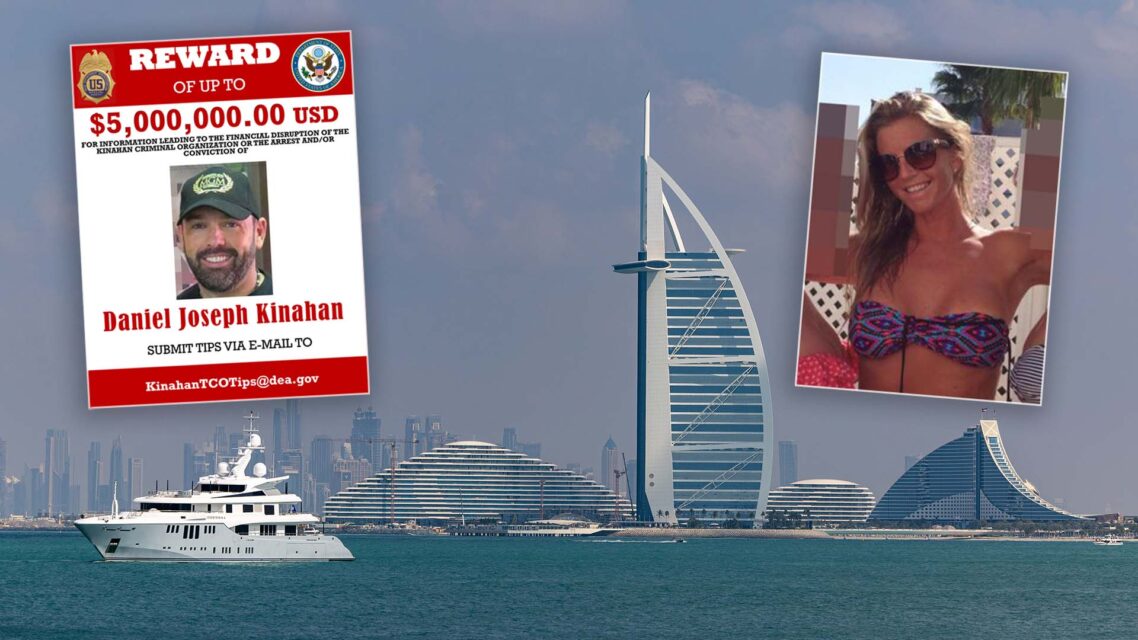
The Burj Al Arab hotel in Dubai, where Daniel Kinahan, inset left, and Caoimhe Robinson, inset right, were married in a lavish ceremony in 2017.
The Kinahan men are the only top members of the super cartel not to have been arrested. U.S. authorities have offered a reward of $5 million each for their capture. They are believed to still be living freely in Dubai, although they have not been seen in public for months. Their trusted lieutenants Sean McGovern (who is the subject of a European arrest warrant in connection with a killing in Ireland), Bernard Clancy and Ian Dixon are also understood to be living in Dubai, despite being sanctioned.
Imperiale told international investigators that when the idea was floated with him of gang rivals being stabbed to death by a “ninja” in Dubai, he thought it was a crazy notion, as it would anger the Dubai authorities, and that “everybody” would be arrested and Daniel Kinahan would be unhappy.
“I was in complete control, I knew this would never happen, and I knew Daniel was on my side, because Daniel was also absolutely against this,” Imperiale told them. “So it was just a game, a psychological power play, a strategic game between groups. But, I say it again, and that’s not to defend the people, because outside the United Emirates, anywhere else in the world where the opportunity had arisen those people would have been killed if necessary.”
ICIJ has previously revealed that another of the sanctioned Kinahan cartel members, John Francis Morrissey, established a website through companies in the British Virgin Islands and Panama with the help of Mossack Fonseca in 2009. Spanish authorities released Morrissey on bail in May while they continued to investigate allegations that he laundered hundreds of thousands of dollars per day for the cartel.
A Spanish judicial source said a lower court in Marbella gave Morrissey his provisional release on bail of 60,000 euros ($65,000) on May 27, seizing his passport and barring him from leaving the country. The source said Morrissey was mandated to reappear in court twice a month. His court hearings have been held in private.
In February, the UAE was dropped from the global Financial Action Task Force’s list of countries at risk of illicit money flows, at the request of Germany, the United States and other Western governments, even as drug traffickers living in Dubai continued to inundate them with cocaine. Dubai Police did not respond to questions.
Contributors: Jan Meuss (NRC), Allan de Abreu (Piaui), Stevan Dojcinovic (KRIK)
Read more similar news:
Comments:
comments powered by Disqus
































